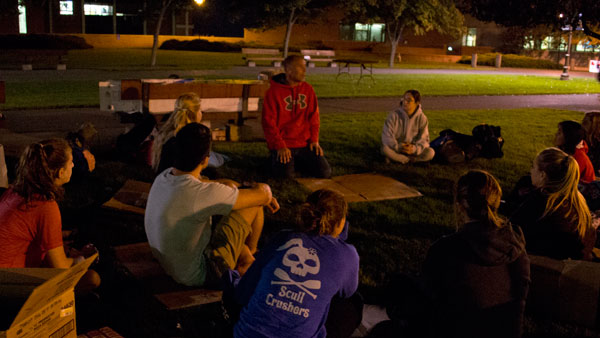More than 20 students spent the night of Sept. 30 in a small encampment of sleeping bags and cardboard on the Academic Quad. The group stayed through the night as a part of IC Habitat for Humanity’s annual “Sleepout for Homelessness.”
The event is meant to bring homelessness to the attention of the Ithaca community. Senior Meredith Sager, IC Habitat for Humanity president, said the group serves as a campus display that gets people to think about homelessness.
“The point of this event is to be advocating for, and raising awareness of, homelessness,” Sager said. “The goal is to get people to come out here and say, ‘Hey, why are all these people sitting outside in the quad, why are they sleeping here, why are there cardboard boxes?’”
The event began with a presentation by Carmen Guidi, a founder of Second Wind Cottages, which is a nonprofit that provides low-income housing to single men in the Ithaca area.
Before the efforts of people like Guidi, the Jungle had been a tent city, where Ithaca’s homeless community had lived since the 1950s. Guidi said this year is the first time in its history that the Jungle has been empty.
While working with the people in the Jungle, Guidi said, it took a long time to establish a relationship with them and gain their trust. He said though working with the homeless is rewarding, it requires a substantial amount of time and effort.
“Dealing with homeless people is not romantic,” Guidi said. “A lot of people are homeless, because a lot of them have addictions … a lot of them have mental conditions, and some of them have both.”
Sleeping outside gives some participants an idea of what the homeless go through every night. Junior Samantha Yu, IC Habitat for Humanity special events coordinator, said her first time spending the night on the campus reminded her of securities she takes for granted.
“When I did it for the first time last year, it was a very humbling experience, because it actually started raining in the middle of the night,” Yu said. “It really adds to the appreciation of what we have and the things we should be doing to give back.”
Though some participants see the event as an eye-opening experience, the sleepout is not meant to serve as a means of understanding homelessness. Sager said sleeping outside for one night is not enough to understand what it feels like to be homeless.
“This event is definitely not a bunch of people trying to say that by sleeping out for one night we’re understanding homelessness,” Sager said. “We don’t by any means claim to understand homelessness by sleeping outside for one night.”








